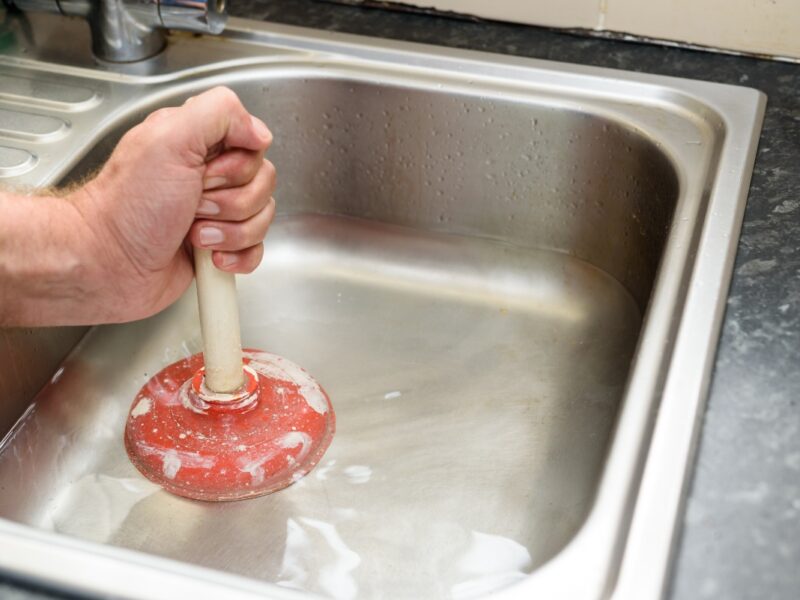We know how tempting it can be to go to the store and pick up a whole range of chemicals that promise to clear your drains, especially in the heat of the moment. But, take a second and think about it. Despite their assurances, most of these products just damage your pipes and leave a lingering chemical smell throughout your house.
We’re here to tell you that there’s a better solution for clearing clogged drains. Keep reading to find out how you can tackle stubborn blockages without spending your hard earned money on bottles upon bottles of chemicals that commonly do more damage than good.
The Dangers of Using Harsh Chemicals
Harsh chemicals may seem like a quick and easy fix, but they often do more harm than good. Chemical drain cleaners, such as Drano, can damage your pipes, harm the environment and even pose health risks to you and your family if you breathe in the chemicals.
So, here are just a few reasons why it's always better to opt for natural methods:
- Harsh chemical cleaners can corrode and damage the internal lining of your pipes. Reducing their strength and durability, shortening their lifespan and leading to repairs or replacements down the line, especially if you use these chemicals frequently.
- Many chemical-based drain cleaners contain toxic ingredients that can contaminate soil and waterways. It is especially important to avoid them if you have a water treatment plant and reuse your water for irrigation purposes as this can spread the chemicals.
- When you pour the chemicals down the drain, they can splash up or leave residue in your sink or shower. The smell also often lingers in the air long after they’ve drained away. This exposure can cause respiratory problems, skin irritation and other serious health issues if ingested.
Natural Methods for Unclogging Drains
Instead of relying on harsh chemicals that come with an array of safety hazards for yourself, your plumbing system and the environment, you opt for these safe, natural methods:
-
- Baking Soda and Vinegar or Lemon Juice: Mix half a cup of baking soda and vinegar or lemon juice in a bowl. Pour the mixture down the drain and let it sit for 2-3 hours before rinsing it down with hot water. The combination will create a chemical reaction that breaks down any blockages.
- Baking Soda and Salt: Similar to above, mix half a cup of baking soda and salt and pour it down the drain to create a chemical reaction. Let it sit for at least 15 minutes before washing it down with hot or boiling water.
- Boiling Water: Pouring hot water down the drain can help dissolve or loosen any grease or food particles that may be causing the clog. Be sure to pour slowly to avoid splashes and scalding yourself. You can also add some dishwashing liquid for a more effective cleaning.
- Plunger: If these natural cleaners don’t work, you can try a plunger. Make sure to form a tight seal and plunge slowly and steadily to create a vacuum-tight seal and create pressure to dislodge the blockage.
- Drain Snake: If the plunger proves ineffective you can try a drain snake (or auger). These tools have a long, flexible rod that can be inserted carefully into your drain and pipes to grab and pull out or break up any blockages so they can flow away easily.
Tips for Preventing Clogs
Prevention is always better than cure! So, to prevent blockages from occurring in the first place, you can:
- Avoid flushing sanitary products, wet wipes (even if they claim they’re flushable because they’re often not!), and other non-biodegradable items down the toilet.
- Use a drain screen or filter in your kitchen sink and shower drains to catch hair, food scraps and other debris before they cause clogs.
- Regularly run hot water through your drains to help dissolve any grease or soap residue that may be building up. Even after doing the dishes, run some extra hot water down the drain to ensure soapy water and any tiny food particles clear the pipes effectively.
Protect your Plumbing System with Natural Methods
Clogged drains don't have to be a hassle! By opting for natural methods and taking preventative measures, you can keep your pipes flowing freely without harming the environment or putting your health and plumbing at risk.
However, if these natural methods prove ineffective, it may be a sign that there is a larger issue that requires professional attention. If this is the case, don’t hesitate to call our experienced team for professional inspections and to get your clogged drains flowing again.


 How to Find A Reliable Emergency Plumber When You Need It Most
How to Find A Reliable Emergency Plumber When You Need It Most

